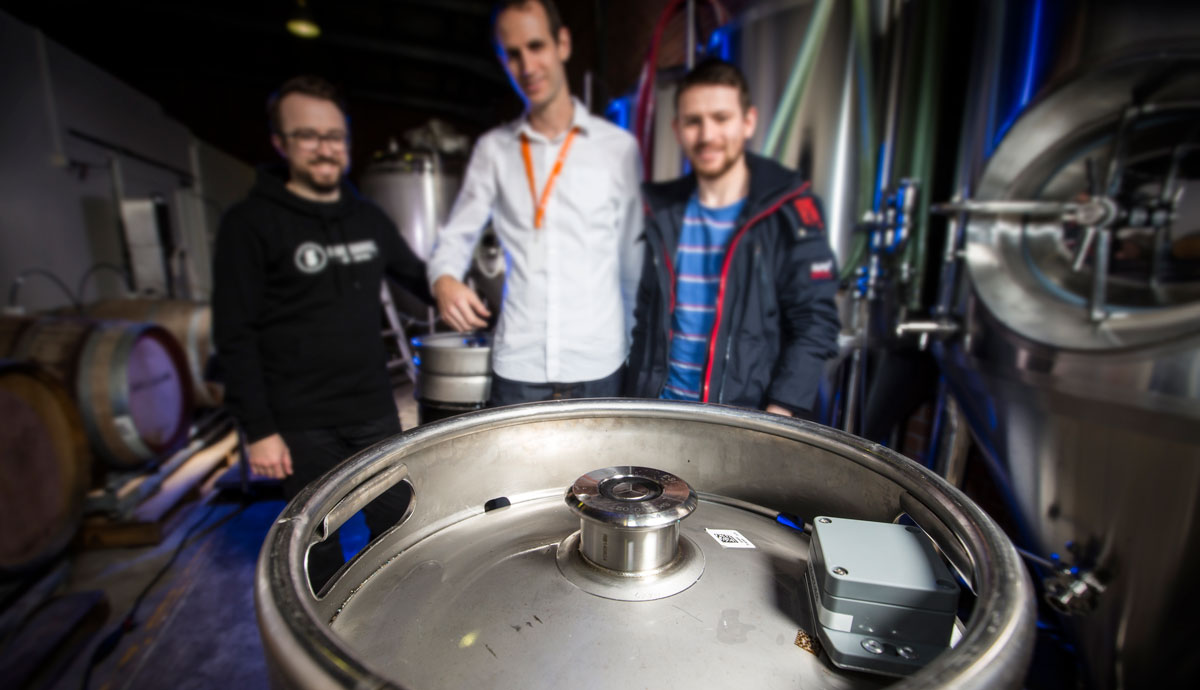August 4, 2017
Internet of Things project ensures the beer keeps flowing
The first project in Wollongong’s ground-breaking Digital Living Lab has launched, with the aim that there will never again be a pub without beer.
Binary Beer is the brainchild of University of Wollongong alumnus, Michael Burton, who used his passion for home brewing to develop ways of measuring how much beer remained in kegs.
“We wanted to find ways of telling them how much beer was left so that they don’t run out beer when they have guests around,” Burton said.
“Then we realised that this is actually an enormous problem that is going out around the entire beer industry. Beer kegs, especially in the craft beer industry are just running out and it can take days before a replacement beer arrives.
“Sometimes, the opposite happens where you have too many beers sitting around for too long and then the beer isn’t as fresh as it could be. That’s where this whole project came about.”
So less than nine months after founding his start-up, Binary Beer, based out of the University of Wollongong’s start-up hub iAccelerate, his first smart kegs have gone out into the world.
Pairing up with Wollongong craft brewery, Five Barrel Brewing, the kegs have gone out to the newly re-opened Headlands Hotel in Austinmer and are reporting on their temperature and location.
They are using the LoRAWAN network, and Internet of Things project set up by the University of Wollongong’s SMART Infrastructure Facility.
The first such network was set up in Amsterdam in 2015, and similar networks now serve a community of almost 16,000 people in 200 cities, including Wollongong, Sydney, Melbourne, Adelaide and Perth.
The cost is low, there is no need to involve telecommunications corporations, the sensors can cost as little as $30 each and can continue transmitting for three years or more on the power of a AAA battery.
The technology is also ideally suited to a city like Wollongong, that is constrained by the escarpment on one side, and the ocean on the other. So just a small number of gateways are needed to provide coverage from Austinmer to Shellharbour, and five kilometres out to sea.
While the gateways will never handle large bundles of data like movie downloads, they are ideal for small packets of information coming from many information points. Like the temperature on beer kegs.
 The first project in Wollongong’s ground-breaking Digital Living Lab has launched, with the aim that there will never again be a pub without beer.
The first project in Wollongong’s ground-breaking Digital Living Lab has launched, with the aim that there will never again be a pub without beer.
The project also has an educational component, and is being developed by a five-strong team of information technology and computer science students lead by James Rule.
“The goal of the project is to leave Michael with a set of tech which he can then finish developing to sell to his customers,” Rule said. "It will allow them to track beer, to track their kegs, how much is in those kegs and how long it’s been away from the brewery. We are trying to prove that the tech is a viable business product.
“If we notice that a certain keg has been hot for very long, and if it’s a dark beer, then you probably don’t want to keep that.
“We’ll come and grab it, send you another one. It’s an automatic thing. Alternatively, you may have three kegs sitting there for a while, we can take two and send them to a bar that does use them and when you do need more, we’ll stock you up.”
Partnering a project is a mandatory part of their final year, but it’s proven to be a valuable learning experience.
“Having to work on embedded hardware is great – it usually just software or theoretical,” Rule said. “We have each learned a new programming description. We’ve learned tonnes.”
Binary Beer has already had talks with some of the biggest of the world’s brewers, including Heineken and Anheuser-Busch.
Burton already has a deal set up though iAccelerate, and was named one of the top 10 Australian start-ups last year.
“All the signs are that we are on to a good thing,” he said.
:format(jpg)/prod01/channel_3/assets/live-migration/www/images/content/groups/public/web/media/documents/mm/uow236205.jpg)